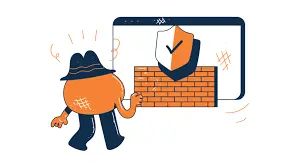What is Human Firewall? All You Need to Know
In the world of cybersecurity, the “human firewall” refers to the people within an organization who play a crucial role in protecting digital assets from cyber threats. As the most vulnerable point of entry for hackers, humans can be both a weakness and a strength when it comes to cyber defense. In this comprehensive guide, we will explore everything you need to know about strengthening your human firewall and leveraging it as a strategic advantage against cybercriminals.
Human Firewall
In the ever-evolving landscape of cybersecurity, where threats lurk around every digital corner, organizations have come to rely on a formidable line of defense the human firewall. This concept, which has gained significant traction in recent years, recognizes the pivotal role that individuals play in safeguarding sensitive data and systems from malicious actors.
At its core, a human firewall refers to a collective of individuals within an organization who are trained and empowered to detect, prevent, and respond to cyber threats. These individuals serve as the first line of defense, complementing the technological safeguards already in place. By fostering a culture of vigilance and proactive security measures, human firewalls have become an indispensable component of modern cybersecurity strategies.
Definition of Human Firewall
A human firewall is a metaphorical term that describes the collective efforts of individuals within an organization to protect against cyber threats. It encompasses the knowledge, awareness, and proactive behaviors that employees exhibit to identify and mitigate potential security risks. Just as a traditional firewall filters out malicious network traffic, a human firewall acts as a filter for human-centric vulnerabilities, such as social engineering attacks, phishing attempts, and inadvertent data breaches.
Now, understanding this concept is simple and entertaining for Hasons. Using the Hasons website you can always stay one step ahead in your job, business, or studies by purchasing New Age Desktops and i3 Intel Core Processor Desktop starting from 15000/-. Monitors, CPUs, and Gaming Desktop are also available. Register on Hasons and order your Tech Partner Now. Get exciting offers and benefits on your every purchase. Contact us so our support team can guide you in purchasing the right Tech Partner.
QuantumLite 4GB RAM Desktop
4 GB Ram For Desktop With Processor Intel Core I5 Gen 10400/Chipset Series H410 (Windows 10 Pro/1TB HDD/256ssd/DDR4/Wired Keyboard, Mouse/ Black), Screen 21.5
Weak Spots in the Human Firewall
While the concept of a human firewall is undoubtedly powerful, it is essential to acknowledge and address the potential weak spots that can undermine its effectiveness.
Phishing
One of the most prevalent threats to the human firewall is phishing attacks. These sophisticated social engineering tactics aim to trick individuals into revealing sensitive information or granting unauthorized access to systems. Phishing emails, malicious websites, and other deceptive tactics can bypass even the most robust technological defenses if employees are not adequately trained to recognize and respond to such threats.
Theft/Loss
Another significant vulnerability lies in the potential for physical theft or loss of devices containing sensitive data. Employees who fail to properly secure their laptops, smartphones, or other devices can inadvertently expose valuable information to unauthorized parties. This risk is further exacerbated in remote work environments, where devices may be used in less secure locations.
Malware
Malware, including viruses, trojans, and ransomware, can infiltrate systems through various entry points, including employee negligence or lack of awareness. Inadvertent downloads, clicks on malicious links, or the use of compromised devices can open the door for malware to wreak havoc on an organization’s networks and data.
Importance of Human Firewall
The importance of a strong human firewall cannot be overstated in today’s digital landscape. As cyber threats continue to evolve and become more sophisticated, relying solely on technological solutions is no longer sufficient. Human firewalls provide a critical layer of defense by addressing the human element of cybersecurity, which is often the weakest link in the chain.
By fostering a culture of security awareness and proactive behavior, organizations can significantly reduce the risk of data breaches, financial losses, and reputational damage. A well-trained and vigilant workforce can detect and report suspicious activities, prevent inadvertent data leaks, and respond promptly to potential threats, minimizing the impact of successful attacks.
Here are a few straightforward methods to enhance the strength of your Human Firewall
1.Education
Continuous education and training are paramount in building a robust human firewall. Organizations should invest in comprehensive cybersecurity awareness programs that cover topics such as identifying phishing attempts, recognizing social engineering tactics, and understanding best practices for data handling and device security. Regular training sessions, simulations, and reinforcement activities can help employees stay vigilant and up-to-date with the latest threats and countermeasures.
Multi-Factor Authentication or 2-Factor Authentication (MFA or 2FA)
Implementing multi-factor authentication (MFA) or two-factor authentication (2FA) can significantly enhance the security of user accounts and systems. By requiring an additional layer of verification beyond just a password, such as a one-time code or biometric authentication, organizations can mitigate the risk of unauthorized access, even if credentials are compromised.
Phishing Tests
Conducting regular phishing tests can help assess the effectiveness of employee training and identify areas for improvement. By simulating realistic phishing scenarios, organizations can gauge the level of awareness among their workforce and tailor their training programs accordingly. These tests should be conducted ethically and with clear communication to avoid causing undue stress or confusion.
Strong Cybersecurity Culture
Fostering a strong cybersecurity culture within the organization is crucial for the success of a human firewall. This involves promoting open communication, encouraging employees to report suspicious activities without fear of repercussions, and recognizing and rewarding individuals who demonstrate exemplary security practices. A positive and supportive environment can motivate employees to take an active role in protecting the organization’s assets.
Implement the Appropriate Measures
While education and awareness are essential, organizations should also implement appropriate technical measures to support their human firewall. This includes deploying robust security solutions, such as firewalls, antivirus software, and intrusion detection systems, as well as implementing secure policies and procedures for data handling, access control, and incident response.
Human Firewall Plan
Developing a comprehensive human firewall plan is crucial for organizations to effectively leverage the power of their workforce in cybersecurity efforts. This plan should outline clear roles and responsibilities, establish communication channels, and define procedures for reporting and responding to potential threats. Regular reviews and updates to the plan should be conducted to ensure its relevance and effectiveness in the face of evolving cyber threats.
Meaning of Human Firewall
A human firewall describes an organization’s employees and their collective ability to prevent cyber attacks and data breaches. It works on the premise that people can act as the first line of defense against cyber threats through security awareness, safe cyber hygiene practices, and the ability to identify suspicious activities. Just as a software firewall monitors network traffic for malware, the human firewall monitors for social engineering techniques, phishing attempts, unauthorized access attempts and other red flags.
Why is Having a Human Firewall Important?
With cyber attacks growing in scale and sophistication, technical solutions alone are no longer enough to protect critical systems and data. The human element plays a crucial role. Consider these statistics:

- 90% of data breaches originate from human error or behavior. Phishing, poor password hygiene and accidental data leaks are common culprits.
- Humans interact with information systems directly through endpoints and access credentials. This gives them the power to make security decisions to allow or block access.
- An estimated 30% of emails with malicious attachments or links are opened by targeted users. A strong human firewall can identify and report these threats.
- Social engineering attacks manipulate human psychology to gain sensitive info or access. A well-trained human firewall is resilient against these techniques.
Strengthening the human firewall through training and policies helps organizations stay a step ahead of rapidly evolving cyber threats. People serves as the critical last line of defense.
Areas of Weakness to the Human Firewall
While people bring strengths to cybersecurity, they also introduce opportunities for weakness that hackers exploit:
Lack of Security Awareness
Most end users lack basic cybersecurity awareness. They don’t understand threats like phishing, don’t use strong passwords, and fail to identify social engineering red flags. Weak awareness makes them vulnerable.
Unsafe Practices
Bad security habits like password reuse, file sharing and unsafe web browsing introduce risks. Employees may disregard policies due to laziness or ignorance.
Susceptibility to Social Engineering
Humans are prone to manipulation through psychology. Attackers use fear, urgency, authority and other triggers to bypass critical thinking and gain access or information.
Unreported Threats
Many users fail to report suspicious emails, activity or incidents. This slows response times and allows attackers to operate undetected for longer.
Non-compliance with Policies
When employees disregard security policies, it weakens defenses. This includes bringing insecure personal devices onto the network, installing unauthorized software and more.
Ways to Strengthen Your Human Firewall
The good news is that while people introduce risks, their behavior can also be modified through training and policies to minimize those weaknesses and amplify strengths. Here are effective ways to strengthen your human firewall:
Security Awareness Training
Ongoing training is essential to shape employee mindsets and improve threat awareness. Training should clarify policies, teach detection of phishing attempts, encourage vigilance against social engineering and promote safe practices.
Simulated Phishing Exercises
Test employee resilience against phishing attempts through controlled simulations. Track click rates to focus training. This exposes weak points and teaches recognition of attacks.
Strong Password Policies
Enforce password complexity rules and regular rotation. Educate users on proper password hygiene including avoidance of reuse and built-in multi-factor authentication where applicable.
Least Privilege Access
Limit employee access to only systems and data necessary for their role. This reduces exposure if credentials are compromised.
Endpoint Protection
Install antivirus, email filtering, firewalls and pen testing tools to add technological layers of defense against lapses in human judgment.
Encourage Speaking Up
Create workplace culture where reporting suspicious activity is rewarded rather than ignored. Security is everyone’s responsibility.
Background Checks
Vet employees during onboarding to reduce insider threats. Especially crucial for users with elevated access to sensitive systems or data.
A Human Firewall Can Help Your Business By:
- Preventing data breaches that damage reputation and bottom lines
- Protecting intellectual property and proprietary information
- Maintaining customer and partner trust through good stewardship of their data
Sources of Human Firewall Security Threats:
- Phishing attacks through email, phone calls, SMS messages
- Malicious USB flash drives dropped in parking lots
- Shoulder surfing by unauthorized persons
- Social engineering methods invoking urgency or authority
Top 5 Essential Traits for an Effective Human Firewall
For maximum security, organizations should look for these qualities in the people that comprise their human firewall:
 1. Cautious and Vigilant Nature
1. Cautious and Vigilant Nature
The best human firewalls have a natural skepticism of unsolicited requests and hyperawareness of potential threats from even seemingly innocent interactions. This could manifest as wariness of emails from unfamiliar senders or inspecting USB drives before plugging them in.
2. Understanding of Policies and Threats
In-depth knowledge of organizational security policies and cyber threats through effective training is a must. They know how to identify risks and when to flag concerns because they understand the tactics of bad actors.
3. Willingness to Admit Gaps in Knowledge
Effective human firewalls admit when they are unsure about the legitimacy of a person, email or situation. They ask for guidance to avoid missteps rather than let ignorance put the organization at risk.
4. A Sense of Shared Responsibility
Top human firewalls feel a shared duty to protect the organization. They are eager to report issues quickly because they care about consequences of a breach for both the organization and their colleagues.
5. Details-Oriented
The best human firewall talent pays close attention to subtle details that seem “off” – a misspelled name, strange sender address or pushy tone. They notice minor anomalies that signal an attack.
How to Improve Your Human Firewall Within Your Company
Turning your workforce into a strong human firewall requires an organizational commitment to ongoing training, culture building and leading by example. Here are best practices for implementation:
Train Across the Hierarchy: Security training should not just be for lower level staff. Executive buy-in and training is crucial for success.
Customize Training: Account for different needs across departments. Key messages will vary for engineering vs HR vs end users.
Make it Relevant: Connect training topics directly to the real threats and policies that staff will encounter in their unique role. Use real examples from within your industry.
Promote Speaking Up: Build culture where reporting concerns is rewarded and retaliation forbidden. Have easy reporting channels.
Lead by Example: When middle managers and leadership model secure practices like strong password hygiene and speaking up about threats, it establishes cultural norms.
Benefits and Limitations of a Human Firewall
The human firewall has unique advantages but also limitations compared to technical controls:

Benefits
- Detect threats that evade Technology -Contextual decisions based on relationship knowledge -Dynamic common sense and critical thinking -Raise alerts on suspicious activity
Limitations
- Prone to lapses in judgment and compliance
- Fatigue leads to misses
- Lack technical detection capabilities
- Inconsistent decision making
- Difficult to audit and measure
This is why organizations need layered technical defenses in addition to human-based controls for optimal security against sophisticated threats.
Reasons Why You Should Use a Human Firewall
Here’s a recap of the compelling benefits of cultivating a strong human firewall within your cyber defense strategy:
- It significantly decreases vulnerabilities introduced by inevitable human behaviors.
- It acts as an additional security filter catching threats missed by tech.
- It leverages critical thinking skills to interpret complex contexts.
- It can make quick risk-based decisions drawing on relationships and history.
- It fosters an organizational culture of shared responsibility and vigilance.
Conclusion
In today’s threat environment, a vigilant and well-trained human firewall acts as a necessary complementary line of defense alongside technical solutions. Although people inherently introduce vulnerabilities into information systems with Bard and Chatgpt, they also have unique strengths that software lacks when leveraged properly. By raising awareness, promoting secure behavior, encouraging speaking up and creating a shared sense of responsibility across your workforce, you can empower people to become an asset that shields your critical systems and data from harm. With dedication and iteration, your human firewall can become an effective early warning system and last line of defense against constantly evolving attacks.
If You are Reading Human Firewall then also check our other blogs: |
|
| Blockchain Technology | Employee Management |
| Application of Internet | Computer Chart |
Human Firewall
- Why is having a human firewall important?A human firewall is critical because people interact directly with computer systems and data, introducing vulnerabilities that technical controls cannot fully cover. Human awareness, judgment and responsibility provide unique protection.
- Why are humans the biggest cyber risk?While humans enable security, they also engage in behaviors that introduce risk like clicking malicious links, using weak passwords and disregarding policies. Attackers exploit these tendencies.
- What is a human firewall and how do you secure it?A human firewall describes an organization's staff acting as a line of defense against threats through awareness, vigilance and secure practices. It is secured through training, testing, accountability and establishing a responsible security culture.
- How can you improve your human firewall?Improvement requires ongoing training focused on organizational policies, emerging threats and real examples; accountability through monitoring and simulated tests; encouraging a speak up culture; and leading by example from managers and executives.
Human Firewall
- Why is having a human firewall important?A human firewall is critical because people interact directly with computer systems and data, introducing vulnerabilities that technical controls cannot fully cover. Human awareness, judgment and responsibility provide unique protection.
- Why are humans the biggest cyber risk?While humans enable security, they also engage in behaviors that introduce risk like clicking malicious links, using weak passwords and disregarding policies. Attackers exploit these tendencies.
- What is a human firewall and how do you secure it?A human firewall describes an organization's staff acting as a line of defense against threats through awareness, vigilance and secure practices. It is secured through training, testing, accountability and establishing a responsible security culture.
- How can you improve your human firewall?Improvement requires ongoing training focused on organizational policies, emerging threats and real examples; accountability through monitoring and simulated tests; encouraging a speak up culture; and leading by example from managers and executives.

